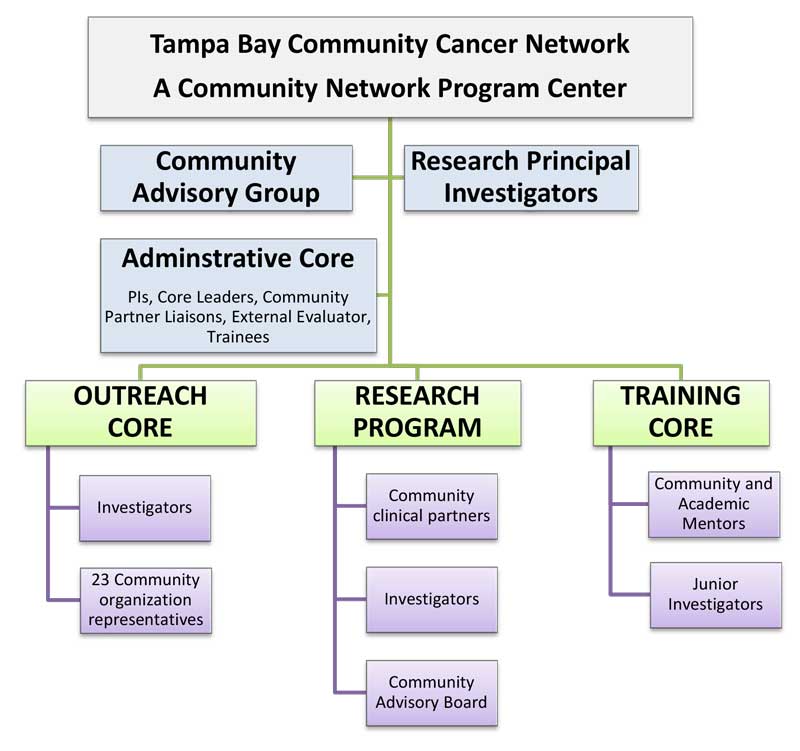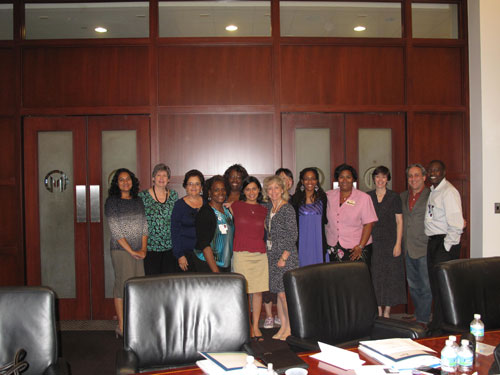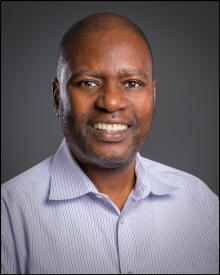The Tampa Bay Community Cancer Network is a collaborative network of academic and community-based organizations and is one of 25 Community Networks Programs across the country funded by the National Cancer Institute's Center to Reduce Cancer Health Disparities. The Tampa Bay Community Cancer Network is comprised of an administrative core, outreach core, research core and training core. Our network is made of local community-based health centers, nonprofit organizations, faith-based groups, adult education and literacy groups, and the Moffitt Cancer Center. Together, our goal is to create and implement sustainable and effective community-based interventions to impact cancer disparities in the Tampa Bay area.
What are the TBCCN Goals?
The overall goal of the Tampa Bay Community Cancer Network (TBCCN) is to find ways to reduce the cancer burden among the medically underserved. Through the network, TBCCN strives to achieve a robust and sustainable infrastructure based on a community network comprised of a recognized NCI-designated comprehensive cancer center, community partners, and academic collaboration with urban and rural health care providers. Key outputs are to strengthen community-capacity building activities, create a series of culturally and linguistically and literacy-sensitive education, training and outreach initiatives, and facilitate the conduct of pilot education/research projects in consideration of cancer, culture and literacy. Outcomes will be through focused and systematic steps delivered according to three phases, each involving community members as integral partners. Our project focus is on breast, cervical, prostate, lung and colorectal cancers. Further, the network is expected to fuel network partners' enthusiasm about the possibilities for collaborative endeavors for the effective and respectful delivery of efficacious cancer interventions research among medically underserved, low-literacy and low-income populations within the community and public health contexts. In terms of overall scientific significance, the project is expected to result in a number of educational and research outputs for application for future population-based outreach and intervention studies beyond the Tampa Bay area.


| Community Partners | |
|---|---|
| Cheryl Pollack | Premier Community HealthCare Group, Inc. |
| Martine Dorvil | University Area Community Development Center |
| Health Disparities Experts | |
| Kenneth Bryant, MD | Suncoast Medical Clinic |
| David Himmelgreen, PhD | University of South Florida |
| Tapan Padhya, MD | Moffitt Cancer Center |
| Marlene Rivera, BSN, MA | St. Joseph’s Hospital |
| Vani Simmons, PhD | Moffitt Cancer Center |
| Susan McMillan, PhD, RN | University of South Florida College of Nursing |
| Tiffany Wallace, PhD | National Cancer Institute |
| Principal Investigators | |
| Cathy Meade, PhD, RN | Moffitt Cancer Center |
| Clement Gwede, PhD, RN | Moffitt Cancer Center |
Principal Investigators
Cathy D. Meade, PhD, RN, FAAN
My research and education interests center on finding engaging and innovative ways to impact health disparities, producing culturally and literacy relevant cancer communications, creating sustained community-based education and outreach initiatives for medically underserved populations, and developing cancer training programs that increase the number of underrepresented scientists. As background, I was one of first investigators to conduct studies in the area of patient understanding identifying the mismatch between patients’ reading levels and the reading levels of health information. Practical aspects of this work have been published widely to help health professionals develop clear, easy-to-understand, and meaningful messages, instruments and interventions. This project, the Tampa Bay Community Cancer Network (TBCCN) addresses critical access, prevention and control issues among medically underserved populations through outreach, training and the conduct of community-based research. Two TBCCN Research projects focus on: increasing colorectal cancer screening (I-FOBT) and evaluating biobanking education in clinic settings. In another project, a transcreated Spanish-language stress management toolkit, titled Cómo tratar el estrés durante la quimioterapia, is being evaluated in a randomized controlled trial involving Spanish-speaking Latinas receiving chemotherapy at cancer centers in Tampa and Miami. Other areas of interest entail establishing an infrastructure for a regional network to examine scientific aspects related to biospecimen collection and biobanking systems, and creating patient navigation models for enhanced cancer care.
Clement K. Gwede, PhD, MPH, RN

Partner Quotes
"I know we tell you this often, but we are thankful for all of the work that TBCCN does for communities in need."
Bruce Edwards, Farmworker’s Self-Help, Inc.
“TBCCN has a wealth of resources to help people on the ground. The key for me is that it is putting resources on a grassroots neighborhood level.”
Cheryl Pollock, Premier Community Healthcare Group, Inc.
“TBCCN provides valuable training and education for diverse communities, communities that need it the most.”
Martine Dorvil, University Area Community Development Corporation
